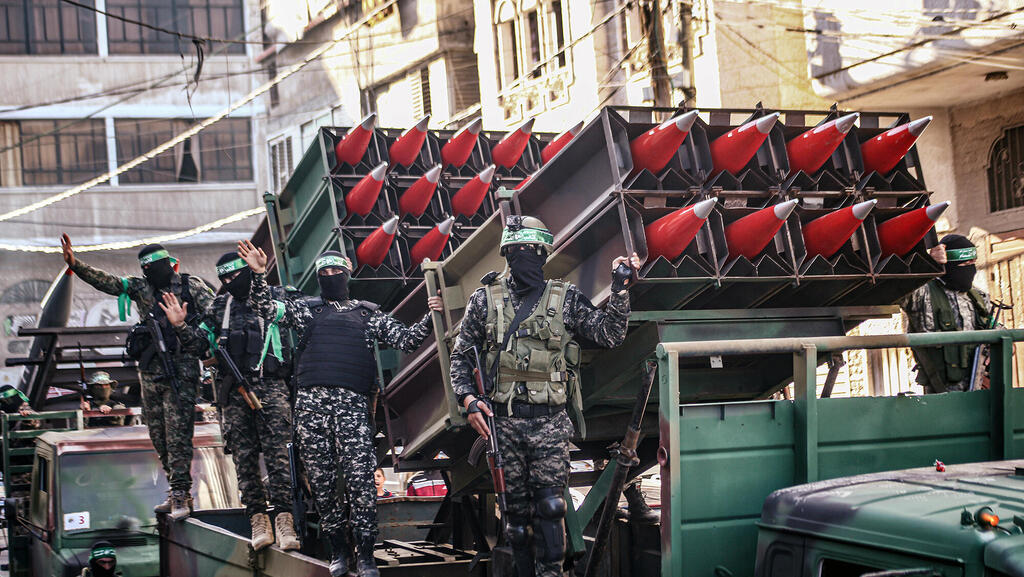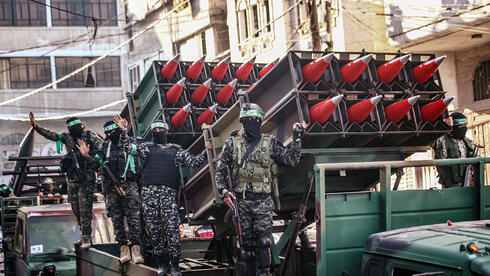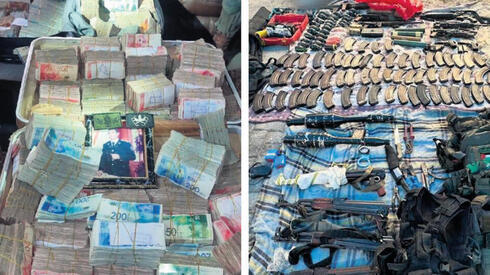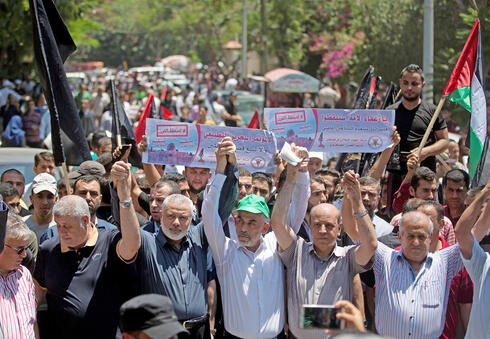
Show me their money: Bringing down Hamas through their pockets
Dr. Matthew Levitt, one of the world's leading terrorist financing researchers, explains why Israel must demand sanctions, even indirect ones, on the financing of Hamas; why we failed when we allowed Qatar to transfer funds to the terrorist organization and how the comparison made between ISIS and Hamas only "causes Israel to lose support because it’s stupid"
Ayman "Junior" Joumaa was a Colombian drug lord of Lebanese descent who made hundreds of millions of dollars smuggling cocaine to the United States, Europe, the Middle East and Africa. He was almost caught twice - first in 1999 in a planned raid by the U.S. Drug Enforcement Administration (DEA) in Colombia, and about a decade later in Beirut, after an American undercover team discovered his used car business, which was used for money laundering. In 2011, he was convicted in the United States, in his absence, of trafficking more than 85,000 kilos of cocaine and laundering $250 million, but he was never punished, and is probably living life as a free man in Lebanon to this very day.
The failure to capture Joumaa is a painful scar for the members of the American DEA. And yet their work was not in vain: thanks to the spying on the money routes, invaluable intelligence was revealed about the creative ways that terrorist organizations launder money and the banks and financing bodies that assist them.
The team that exposed Joumaa's car business discovered that the profits transferred from it to the Lebanese-Canadian Bank (LCB) did not correspond to the volume of goods sold at his lots - one of which was owned by an entity linked to Hezbollah. They concluded that the money from the drug trade in Europe was added to the money from the sale of the cars in order to maintain a legal framework, and convinced the United States Department of the Treasury to activate the doomsday weapon: a boycott on the LCB for its "ties to a global narcotics trafficking and money laundering network and Hezbollah."
"The United States Department of the Treasury has defensive tools and offensive tools, the difference between them can be not so big, and if I, from a defensive perspective, take an action that excludes you from the US financial system, it’s going to have some very offensive ramifications," explains Dr. Matthew (Matt) Levitt, one of the world's leading terrorist financing researchers. “This authority was also exercised in 2005 on Banco Delta Asia in Macau, which was knowingly banking illicit funds from North Korea including what turned out to be the part of The Leaders’ slush fund - and it imploded the bank." Indeed, the Lebanese-Canadian Bank also no longer exists today.
Levitt knows what he's talking about. He began his professional career in the field of counter-terrorism in 1998, as an intelligence analyst at the FBI. He later worked as deputy assistant secretary for intelligence and analysis at the United States Department of the Treasury and was involved in formulating the economic sanctions against Iran, and from there he moved to the United States State Department, where he worked for about a year and a half as a counter-terrorism advisor. He is currently director of the Reinhard Program on Counterterrorism at the Washington Institute for Middle East Policy and a lecturer on terrorist financing at Georgetown University. He is the author of four books on terrorist organizations in the Middle East, the latest of which, "Hezbollah: The Global Footprint of Lebanon's Party of God" (Georgetown University Press), deals, among other things, with the organization's drug trafficking activities. In the last decade, he has regularly testified at hearings in the Senate and Congress on the subject of terror financing.
What can Western countries do to fight terrorism in the financial arena?
"The countries that make up the international financial system (IFS) have a tremendous amount of input on what happens in it, and through it they can seriously damage terrorist organizations. There are regulatory authorities that monitor businesses and charities that help terrorist organizations, there are law enforcement authorities, there are intelligence agencies and there are laws that can be imposed. The United States Department of the Treasury and the Israel Money Laundering and Terror Financing Prohibition Authority (IMPA) have already announced the establishment of a task force to combat terrorist financing (jointly led by the financial intelligence units of Germany, Israel, the Netherlands, and the United States), and European governments are providing it leads. So I expect that there will be further actions against Hamas financial support entities in Europe and elsewhere, even in Malaysia - a country to which Hamas traditionally sends its research and development scientists to learn how to develop drones, that has just banned ships bearing the Israeli flag from docking at its ports. The same Malaysia shut down a charity suspected of funding Hamas. And this is because countries do not want to run afoul of AML/CFT (Anti-Money Laundering and Combating the Financing of Terrorism) regulations."
"Qatar internalized the message"
Levitt (53) is a Hebrew-speaking American-Jew, who visits Israel annually, even in times of war. "A few weeks ago I visited Kfar Azza, I felt a strong need to see what happened, because it's amazing to me how many people are comfortable denying that it all happened. I started my career at the FBI and got to work in other government agencies. I saw a lot of things, but what I saw in the 47 minutes of video footage of the October 7 massacre I have never seen before, and some of it I will never forget."
His affinity for Israel charges his fight against terrorism with a sense of personal mission. "On my last visit to Israel, I spent quite a bit of time explaining to people why it is wrong to compare ISIS to Hamas, because it is a stupid comparison that causes Israel to lose support, rather than gain it."
The levels of brutality of the October 7 attack and the use of stimulants were very reminiscent of ISIS.
"The fact that Hamas members did barbaric things like ISIS on October 7 does not make them ISIS. These are two very, very different organizations, with different ideological bases and goals: ISIS fights everyone, and Hamas does not. Hamas fights Israel. The comparison is used as a PR tool to garner sympathy and support, but it does neither."
Isn’t there also a similarity in the fundraising method of the two organizations?
"People focus on the massive amounts of money that ISIS obtained from oil and gas, which is accurate, but Hamas earned almost the same sums from managing the Gaza Strip. When you manage a territory of this size, you can get lots and lots of money."
The Gaza Strip’s economy was valued in 2021 at an estimated $27.7 billion, and the CIA estimated in 2018 that the Hamas-ruled Gaza Strip receives 18.7% of its GDP from taxes and “other revenues”. The last time he testified in a hearing in the Senate about two months ago, Levitt emphasized that this is the main source of funding for the organization - about $300-400 million a year comes from taxing income, real estate, goods entering the Gaza Strip through the Rafah crossing and the Kerem Shalom crossing, and more. "And also extortion, protection fees and border control," points out Levitt. "Until recently, most of the people who are not in the small group that works on these things, had no idea that the single most significant source of income for Hamas for at least the last decade is Gaza," says Levitt. "And this is not money they theoretically have in companies or funds they can’t access in their investment portfolio."
In other words, the overthrow of the Hamas government will be a fatal economic blow to the organization.
"If the Israeli defense and security forces do dismantle the rule of Hamas, or even just greatly undermine its power, then these taxes and commissions will be eliminated as a source of income, and therefore its dependence on Iran, the investment portfolio, the influence of charitable organizations and crowdfunding will increase. In the immediate term, the two channels in which there is a lot of growth right now are charities and crowdfunding."
Levitt explains that Hamas likely loots international support funds that go into the Gaza coffers - and not directly into the Hamas coffers - for civilian purposes. For example, in the years 2014-2020, UN agencies provided approximately $4.5 billion to programs in Gaza; the Palestinian Authority in the West Bank pledged to spend $1.7 billion in 2021 to support salaries for civil servants; and Qatar transferred $166 million annually for humanitarian aid and salary support since 2012.
"The transfer of funds from Qatar, which was done in full cooperation with Israel, is what allowed Yahya Sinwar to maintain a serious stake in his governance project in Gaza," Levitt says. "This was the Israeli policy: to maintain the peace in Gaza by making sure that there is sufficient economic activity there. But it was a mistaken policy, and we discovered it in the most painful way."
But the responsibility of the Qataris for the strengthening of Hamas is greater than the funding that was openly transferred. "In my understanding, there is also covert financing," says Levitt, "and Doha also provides a haven for Hamas leaders. It is true that it is convenient to have a place where the head of the Mossad and the head of the CIA can meet for informal talks, but it also means that the leaders of the organization had a safe haven to plan the October 7 attack, and the Qataris are responsible for that. And when senior Qatari officials state to AP that they understand that things will have to change from now on, and then there are reports that the leaders of Hamas have left the country - you can understand that people got the message."
Related articles:
Between Iran and Erdogan
Tracking the money that finances terrorist organizations is a Sisyphean task. "You need to form some tapestry that connects your finance people with the intelligence people and the law enforcement people, and there are many ways to do it, but it is important that it is done. It is not enough to look at the (accounting) books. I can tell you about many cases where we looked at the books, and they were squeaky clean, in retrospect, too clean. And then maybe we looked at the books in a different way and found out that there were two sets of books. Then you realize something else is going on. Because on paper you are dealing with perfectly legitimate companies: real companies that do real business with real investors. You’re going to need some other insight into the fact they’re illicit by virtue of the fact that they are in whole or partly financing Hamas. And for that you need intelligence and enforcement bodies."
Things of course get even more complicated when it comes to cryptocurrencies. Dr. Shlomit Wagman-Ratner, Global Chief Regulation and Compliance at Rapyd, a Research Fellow for the Center for Business and Government in the Kennedy School of Government at Harvard University, and who served as the Director-General of the Israel Anti-Money Laundering Authority from 2016-2022, explains that "Hamas has been working in crypto since 2019 and has accumulated several tens of millions of dollars. Over time, it moved from Bitcoin to more sophisticated currencies that are more difficult to track such as Tron, and learned how to work with crypto exchanges that do not adhere to money laundering rules."
As someone who was a partner in formulating the sanctions against Iran, Levitt is a big supporter of this tool for the fight against terrorism, with an emphasis on secondary sanctions. "The United States," he says, "has the authority to impose secondary sanctions, that is, those that are imposed not on the body itself but on anyone who does business with it. However, at the moment they are imposed only on one terrorist organization - Hezbollah (by virtue of the International Financing Prevention Act for Hezbollah that passed in 2014). I would like someone in Congress to explain to me why they haven't passed a law giving the United States the authority to impose secondary sanctions on all foreign terrorist organizations? The meaning for an entity upon which such a sanction has been imposed is that it is impossible to do business with it, because if you do business with it, maybe sanctions will be imposed on you as well."
But it doesn't always work. In May 2022, the US Department of the Treasury published the value of Hamas's investment portfolio and declared some Hamas elements and six companies it owns as terrorist operatives - one of them is the Turkish real estate investment fund Trend GYO, which is traded on the stock exchange in Turkey. This announcement instructs the global financial systems not to supply these elements financial services and freeze their assets. However, in the above case, not only were the assets not frozen, but the Trend GYO stock has since tripled, peaking last September.
Still, Levitt believes that this move succeeded in limiting the organization's steps. "Even before October 7, Hamas had difficulty withdrawing money from this portfolio, which suggests to me that things were done. Of course it would have been better to take control of the money, but also limiting the ability to access it is huge."
This is where the secondary sanctions can serve us.
"True, in that case, if the Turkish government does not act against Trend GYO, because Erdogan does not think that Hamas is bad at all, then secondary sanctions will allow us to effectively close this company, because anyone who does business with it will no longer be able to do business with the United States or in dollars.”
Hamas’ investment portfolio was a source of embarrassment for Israel. The New York Times published a major investigation about it a month ago with the headline: "Israel Found the Hamas Money Machine Years Ago. Nobody Turned It Off".
"The fact that Israel had access to documents that described Hamas' investment portfolio back in 2018, and that it did not 'jump' on it, is not a huge failure. And the fact that not only Israel, but also the United States did not act on the matter, should tell you something. There is always this uncomfortable tension between following the money and stopping the flow of funds. Your gut tells you to stop the money going to the bad guys, but following the money is often a very effective tool for mapping out other parts of the network that perhaps you wouldn't otherwise know about."
Still, the investigation lists an investment portfolio worth half a billion dollars, not a small amount of money.
"People watch too much TV. When you watch a show like Fauda, at the beginning of the episode you have a fancy spreadsheet, and five minutes into the episode, there is a raid on a Hawala (an informal value transfer system based on the performance and honor of a huge network of money brokers). In real life, it doesn't work like that. The fact that you have a spreadsheet doesn't mean you have everything. You have one piece of information that may not be fully verified, and another piece of information that says that Hamas owns 7% of something - are you going to blow this something up?
"The New York Times investigation was a big story, but it missed the boat on two points: First, the inaction regarding the investment portfolio despite knowing about it is not necessarily operational negligence because there are good reasons not to act. And secondly, it presents the unequivocal conclusion that the investment portfolio of Hamas is the biggest issue in the world, when it is not. True, it is half a billion dollars. But they are not liquid, because as mentioned - Hamas had difficulty withdrawing the money it wanted from this portfolio. So that is not what funded October 7."
Iran, according to various estimates, transfers $70-100 million a year to the Gaza Strip for terrorist infrastructure. What can be done about it?
"We will not be able to stop Iran's willingness to finance Hamas, but we can limit the ability to move these funds. These money transfers are based on the exchange business, and we have many tools there - the Israelis targeted several of them in the current war, and only recently it was announced that one of the significant managers of an exchange was killed, and there are many more things that the international community can do. The United States and the Iraqi government have done a lot in this regard in the fight against ISIS."
How do you explain the case of Abdelbasit Hamza, a Sudanese businessman with known ties to al-Qaeda since the 1990s, who was accused of money laundering and even served a prison sentence for transferring $20 million to Hamas, according to reports? How come nothing was done about this?
"I would describe Sudan as a fairly unregulated financial system."
He also has business in Europe.
"But he lives and is based in Sudan. And maybe not everyone in Europe is that strict about who they do business with. Maybe it's a question of how much percent he had in this company and how much in that company, or if he kind of whitewashed his position enough by selling his shares. I also assume that people were much more caught up in his ties to al-Qaeda than the fact that he was involved in a company that is in the Hamas portfolio, and maybe that wasn't clear enough either. Bottom line, I have no other way to explain it - there is so much illegal financing going on that we are never going to be on top of all of it."
"Hezbollah is more dangerous than Hamas"
The funding of Hamas, explains Levitt, is a drop in the ocean compared to the funding of Hezbollah. "Hezbollah is bigger and more dangerous than Hamas, having a much larger budget," he says. "It relies heavily on Iran, $0.7-1 billion a year - plus abuse of charity and crowdfunding and tremendous organized criminal activities, some of which also act as Hezbollah procurement channels. But it also has the ability to make money off being both part of, and apart from, the Lebanese government. It has even started building its own nascent relationship with Russia, in part to evade sanctions.”
Ultimately, after the secondary sanctions of the United States, the war in Syria and the support from Iran, is Hezbollah today stronger than it was a decade ago, or weaker?
"Stronger, but that's an unfair question."
Why?
"Every time I visit the Blue Line (the border with Lebanon), I ask the Israeli official I speak with: How much longer will you allow Hezbollah to build more and more capabilities on the border? And the answer I get is: This is the policy. So is the strengthening of Hezbollah the fault of the meager tools being used to fight terror financing? Is this the fault of the Israeli policy of appeasement? And this policy can be understood because a war with Hezbollah would have exacted much heavier prices than those of October 7.
"So yes, the bottom line is that Hezbollah is stronger today compared to a decade ago, because it had time to rebuild itself. Its people survived the heavy losses in Syria, the Special International Tribunal for Lebanon on Rafic al-Hariri, and the explosion in Beirut in 2020, and they are currently in the process of surviving the political, and even more than that the economic, crisis in Lebanon. In the end, Hezbollah is Iran's most successful proxy, and the reason why there is a balance of mutual deterrence between Hezbollah and Israel is that not only is Israel strong, but so is Hezbollah."



